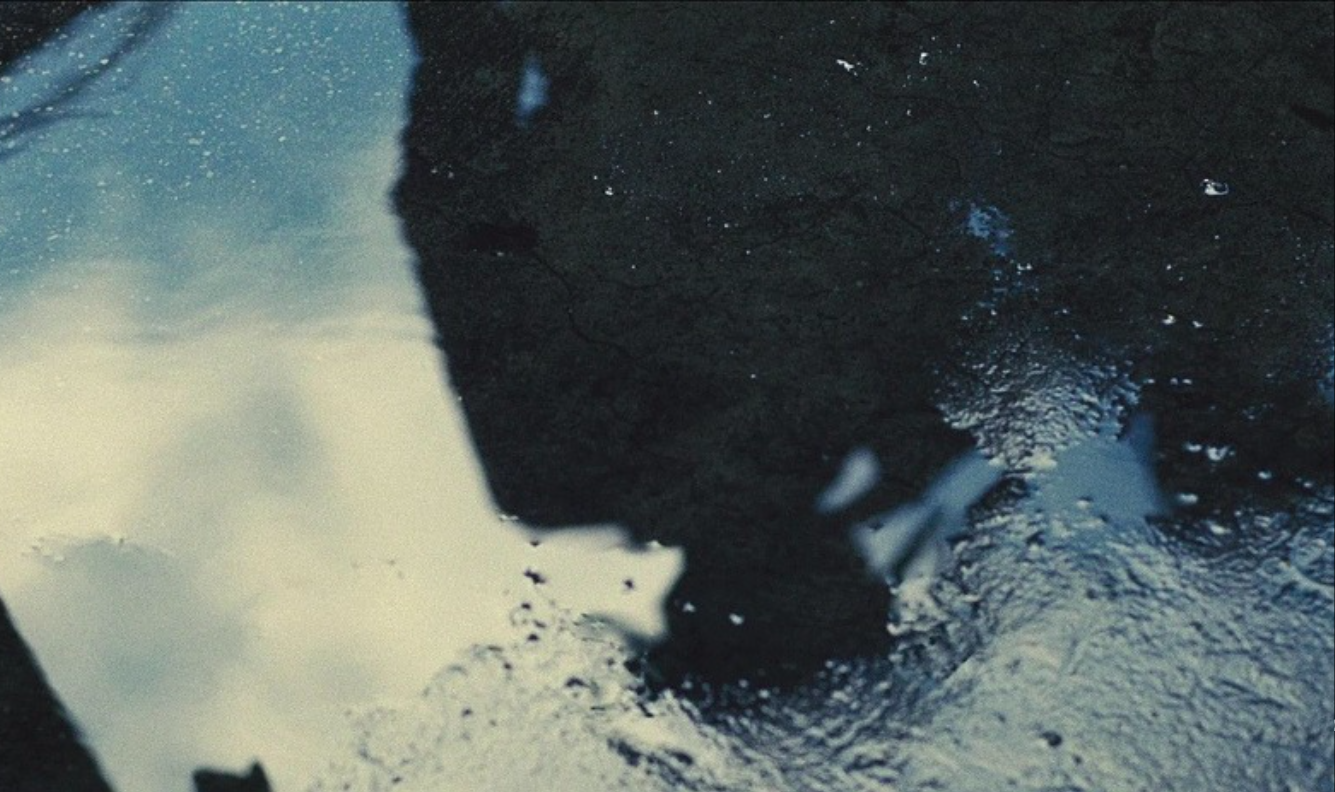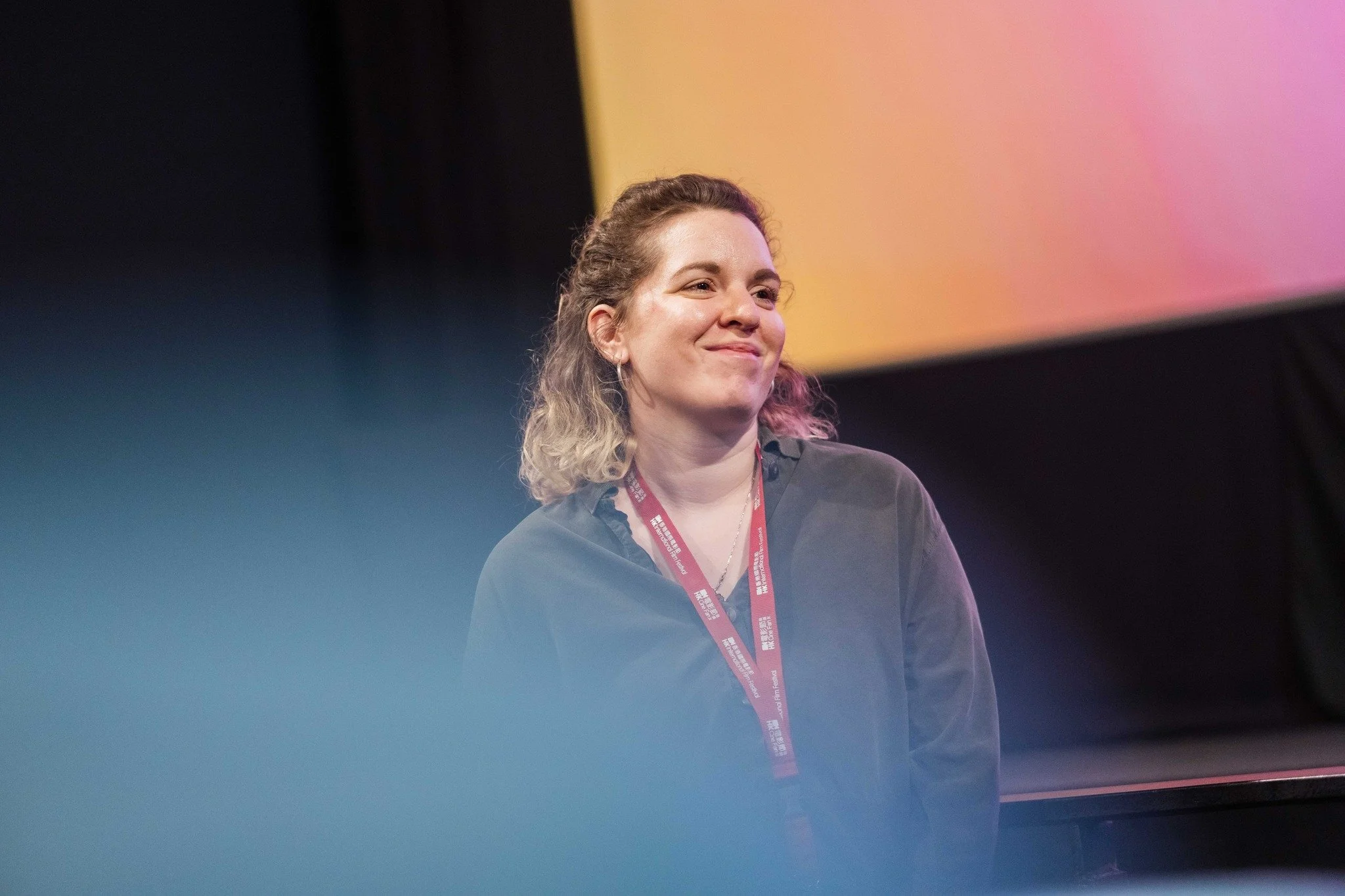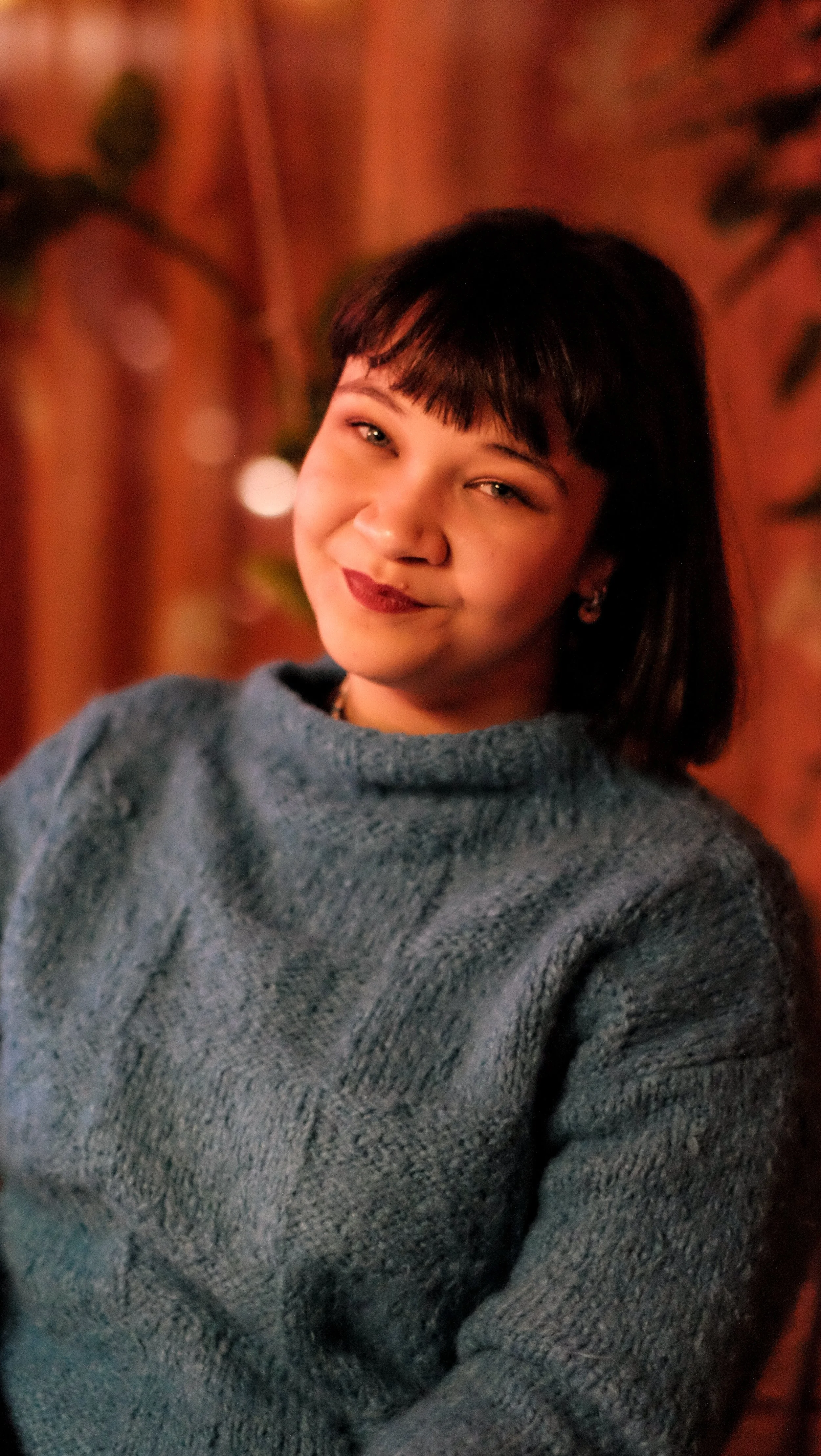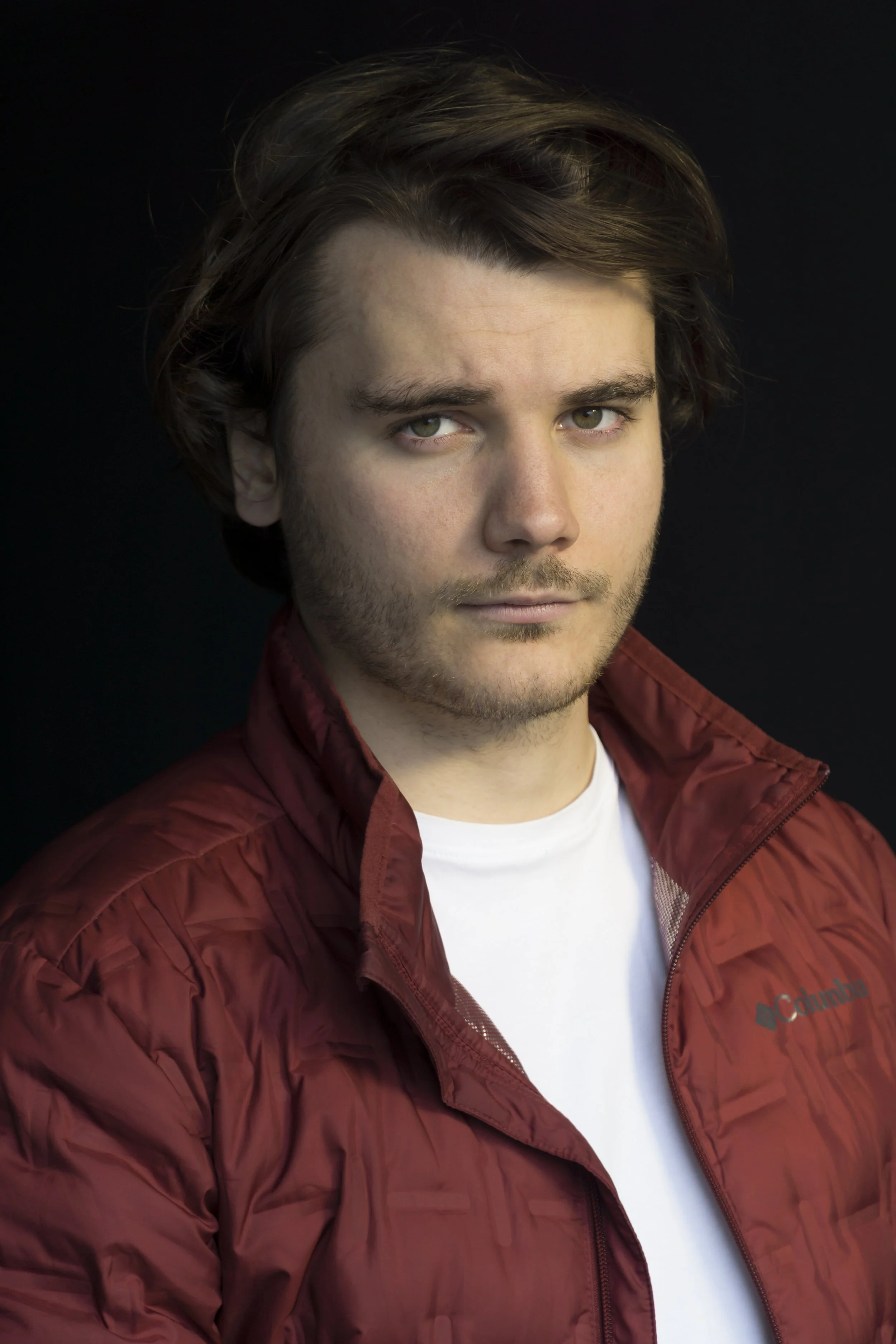Dorka Vermes
PLACES HALF EMPTY
A controversial and intimate portrait of a queer relationship in the context of Orbán’s Hungary.
SYNOPSIS
Budapest, early fall, in a dilapidated apartment block in the ghetto district. Independent but vulnerable, thirty-two-year-old Noá lives in a near-empty sublet, among boxes and curbside furniture, constantly ready to move. She is working as an illegal cab driver doing small-time business and hoping to save enough money for her own apartment, in which she could have a safe and solid place in the world. During a night ride, she meets twenty-six-year-old Juli, an affluent suburban woman who is trying to escape her family, but is unable to break away from her overbearing parents and the family’s chihuahua business. The two women soon fall in love, but Juli doesn’t reveal the whole picture about her complicated family life to Noá. For her parents, it is unacceptable that Juli is in a lesbian relationship, so Juli creates a double life, while promising Noá that she will gradually distance herself from her controlling family. After moving to Noá’s place, Juli begins to rent a sublet in which she creates a facade to hide the fact that she is living with another woman. From time to time, Juli greets her mother in the fake apartment, acting as if she had roommates. At first, Noá tries to face this situation with humour and patience in order to deal with the various absurd situations the set-up creates but eventually, the lies and the secrets begin to poison their relationship. Juli is afraid of losing her financial stability while Noá fears Juli will never be able to take her in public. They are also burdened by the financial problems created by this double life. Juli is trying to get more money from working for the kennel in order to become financially independent, while Noá undertakes increasingly risky illegal deals to make ends meet. At the film’s high point, Juli’s mother gives an ultimatum to her daughter: Either she stops lying and returns to her family and the kennel business or, if she wants to live with Noá, then she will have to do everything on her own, without financial or emotional support. Juli is shaken—she honestly loves Noá, but she is afraid to lose her parents and to become financially independent. For a while Juli is trying to please both worlds, but eventually, she confesses to Noá that she is unable to step away from her parents. In the end, Noá lets her go. In the closing scene, we see Juli in a newly furnished, wide apartment that includes a mini-kennel, which suggests she has become physically independent but at the same time, has moved deeper in the co-dependent relationship she tried to get away from in the beginning of the film.
DIRECTOR
Dorka Vermes
PRODUCER
Evelyn Balogh, Botond Lelkes
PRODUCTION COMPANY
Non Lieu Film Productions
COUNTRIES
Hungary
Dorka Vermes
Dorka Vermes is a director based in Budapest. She started her master’s degree in film directing at the University of Film and Theatre of Budapest, and completed in the joint programme of FreeSZFE Association and Filmakademie Wien in 2023. During her school years, her short films were selected by numerous international film festivals, including the Film Festival Cottbus, the Sarajevo Film Festival, and Filmshoolfest Munich, and received prestigious awards. ÁRNI, her first feature-length film, had its premiere at the Venice Film Festival and was nominated for the Queer Lion Award. In the making of ÁRNI, her long-time mentor Béla Tarr supported her as creative producer and has now committed to PLACES HALF EMPTY as an executive producer. Human vulnerability makes the core of her previous stories, accompanied by strong atmospheres and queer characters as seen in her current project. With this feature-length film, Vermes dives deeper into the themes that define her work, creating a more immersive and layered narrative experience..
Can one find a sense of home in a society that offers no room to be different—not socially, emotionally, or physically? I'm interested in the subtle, everyday gestures that normalise exclusion. How does a generation learn to erase its desires, identities, and affections—more out of necessity than fear, because it has become the practical way to survive? Juli and Noá's story is not symbolic or programmatic—it is a lived, imperfect relationship. Two young women navigate love on the margins, where intimacy becomes both strategic and a sanctuary. The world of chihuahua breeding, the rented apartments, the taxi as transient spaces—these are not exotic details but fragments of a social aesthetic, shaped by instability. The film’s visual language is restless, close, and fragmented: handheld camera, natural light, long takes. Not to dramatise, but to expose layers—leaving the viewer with questions rather than answers. The Hungarian context is not just a backdrop, but a structuring force: shaping choices, movement, speech. This is not a film "about queerness," but an inquiry into how space and politics shape the very conditions of love.
DIRECTOR’S STATEMENT
Evelyn Balogh
Evelyn Balogh is a Budapest-based Hungarian filmmaker, born in 2001. She graduated from the Corvinus University of Budapest in 2023 with a BA in business and administration. During her university studies, she became involved in Budapest’s filmmaking scene and has pursued this path ever since. Coming from a family of visionaries and artists, she never felt at home in the conventional fields of economics and business. This led her to filmmaking, where she found her true passion. In the production department, she discovered the perfect balance between artistic expression and logistical, strategic thinking—an intersection that fuels her motivation and ambition. In recent years, she has participated in several creative and commercial projects as part of the production team, gaining experience in the technical aspects of production. In 2024, she enrolled in the Production: International Financing and Co-Productions programme at the Cross-Border Film School in Italy. This programme marks a significant milestone in her career, providing the opportunity to collaborate with European filmmakers and gain valuable insights into co-productions from international film professionals.
PRODUCER’S STATEMENT
Non Lieu Film Productions is proud to support PLACES HALF EMPTY as we believe the new generation of filmmakers in Hungary have faced significant struggles over the past years. As producers, we are fully committed to bringing this project to life, as we see its potential to connect with audiences around the globe. Our society stands on the threshold of an irreversible crisis, and we can see that films like PLACES HALF EMPTY have the power to heal, spark conversations, and strengthen our communities. Dorka Vermes’s next film reflects on deep social divides and pressing societal issues through an intimate drama. Unlike her previous film, ÁRNI, which conveyed its message through atmosphere and unspoken emotions, PLACES HALF EMPTY is mostly a dialogue-driven film. Its true meaning, however, still lies beneath the words, between the lines. These are the values Béla Tarr also took a stand for as executive producer and the reasons he is committed to supporting Vermes through this creative journey.
Botond Lelkes
Botond Lelkes was born on in Budapest in 1999. In 2023, he graduated from the University of Theatre and Film Arts with a degree in acting. In 2020, he founded the Satöbbi Interdisciplinary Arts Association, followed by the NoN Lieu movement and, in 2022, he established Non Lieu Film Productions Ltd. The organisations he has founded emerged as an instinctive response to the transformation of Hungary’s cultural landscape. His goal is to create and sustain communities that support free and high-quality culture without censorship. Coming from a multi-generational family of visual artists, Lelkes realised that high-level art alone is not enough—it must also reach people. This fundamental experience has shaped his decisions since childhood. As an actor and composer, he recognises that an engaged audience is an essential part of any artistic creation. His primary aim has always been to support artists who struggle to represent themselves and to provide them with opportunities and visibility. This realisation strengthened his sense of purpose more than ever: he understood that he could actively contribute to creating opportunities that support artists’ work while also participating in these projects as a creative artist himself. As a producer, actor, and composer, he has been involved in numerous creative and commercial projects in recent years.
Production company profile
Non Lieu—"non-place"—emerged out of the political controversies surrounding the Hungarian film scene in recent years, shaping a creative community inspired by Marc Augé’s philosophy. The company supports Hungarian filmmakers by providing international opportunities and ensuring artistic freedom beyond state constraints. Actively engaged in international co-productions, Non Lieu expands its network through global workshops. The company’s slate includes feature-length documentaries and art-house films made with Hungary’s new generation of filmmakers, and it embraces low-budget, high-quality production with a focus on sustainability.
Where are we at?
TOTAL ESTIMATED BUDGET
400.000 €
FINANCES PENDING
388.000 €
FINANCING IN PLACE
12.000 €
Production timeline
JANUARY 2025 - JUNE 2026
Project development
JUNE 2026 - SEPTEMBER 2026
Pre-production
SEPTEMBER 2026 - DECEMBER 2026
Shooting
JANUARY 2027 - JUNE 2027
Post-production
2027/2028
Premiere





